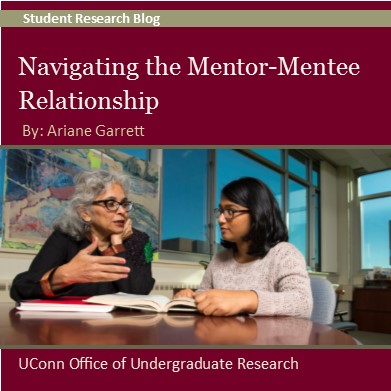By: Ariane Garrett, OUR Peer Research Ambassador
The mentor – mentee relationship in a lab can be tricky to navigate. Unmet expectations are often the cause of breakdowns in the relationship. It’s essential to clarify goals and expectations early on to assure a productive and satisfying experience. Remember that the mentor-mentee relationship goes two ways. Just as your mentor holds you to certain baseline standards, you should expect certain things from them as well. As you begin a research experience, use the tips below to help you develop and maintain a strong mentor-mentee relationship.
1. Supportive Mentorship
Strong mentoring relationships are grounded in mutual respect. Mentors should serve as role models that help you develop your skills and competencies, and progress as a researcher. They should also allow for growth, encourage you to challenge yourself, and provide you with constructive feedback that supports and educates, not belittles or shames. If you don’t feel as though you’re learning and growing through your research experience, or that you’re receiving constructive feedback on your work, you should have a conversation with your mentor to discuss what you’ve contributed and opportunities to take on more responsibility. Better yet, as you begin your research experience, work with your mentor to develop a learning plan that outlines your goals, the skills you want to develop, the steps that you and your mentor will take to get you there, as well as a plan for receiving feedback.
2. Research Schedule
More than any other complaint, the one I hear the most from my peers is that they are asked to work ridiculously long hours in the lab. In the beginning of the semester or your project, you should decide with your mentor the hours you are willing and able to put in. At key points in the project, you may want or need to work more hours than you are typically scheduled for, which of course is completely fine. However, there shouldn’t be an expectation that you are available to work more hours than what you had originally agreed upon.
3. Safety & Training
Some labs contain dangerous equipment or materials, and you may be asked to work with them. Before you are put in that position, you should receive appropriate safety training to assure you are comfortable in that role. If you do not have the appropriate training, cannot access necessary personal protective equipment, or do not feel comfortable using the equipment or materials for any reason, you need to say so. Safety is paramount. A good mentor will respect you for voicing your concerns, and work with you until you feel more comfortable and prepared.
4. Credit and Authorship
If authorship is something you aspire to, have a conversation with your mentor early on to share that goal, and to map out a plan for contributing to the research in a way that will position you to earn acknowledgement in the form of authorship. Keep in mind that the path to authorship is not always straightforward. Submitting work for publication is often the culmination of years of collaborative work. As projects evolve, the level of contribution and collaboration for the parties involved may change. You may not be in a position to see the full extent of the contributions others have made to the project throughout the research process, making it difficult to fully understand why one person is listed as an author and another person’s contributions are acknowledged in other ways in the publication. Have conversations with your mentor about authorship periodically throughout the research process to avoid misunderstandings.
Ariane Garrett is a sophomore double majoring in biomedical engineering and Spansih. Click here to learn more about Ariane.